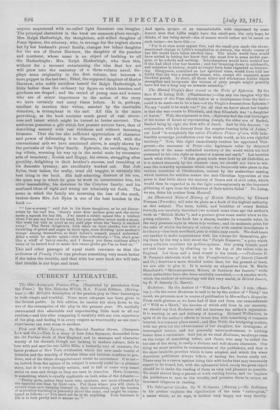Pink and iVhite Tyranny. By Harriet Beecher Stowe. (Sampson Low
and Co.)—This is a story of how John Seymour, descended from the old Puritan stock of Now England, and in manners and character worthy of his descent, though not lacking in modern culture, falls in love with and marries ono Lillie Ellis, a butterfly sort of creature, the latest product of New York civilization which the new-made wealth of America and the worship of Parisian ideas and fashions combine to pro- duce, and of the bitter disappointment which ho encounters. It is not- es, indeed, from the nature of its subject it scarcely could be—a pleasant story, but it is very cleverly written, and is full of some very smart
satire on men and things as they are seen in America. Here, however, is something which is equally applicable on both sides of the Atlantic:—
" Pretty girls, unless they have wise mothers, are more educated by the opposite sex than by their own. Put them where you will, there is always some man busying himself in their instruction ; and the burden of masculine teaching is generally about the same, and might be stereo- typed as follows :—' You need not be or do anything. Your business in life is to look pretty and to amuse us.'" And again, hpropos of an uncomfortable wish expressed by some honest man that Lillie might have the small-pox, the only hope, ho thinks, of her being saved—she of course would rather not be saved on such terms—we have this :— " For it at once must appear that, had the small-pox made the above- mentioned change in Lillie's complexion at sixteen, the whole course of her life would have taken another turn. The whole world then would have united in letting her know that she must live to some useful pur- pose, or be nobody and nothing. Schoolmasters would have scolded her if she had idled over her lessons ; and her breaking down in arithmetic, and mistakes in history, would no longer have been regarded as interest- ing. Clergymen, consulted on her spiritual state, would have told her freely that she was a miserable sinner, who, except she repsnted, must likewise perish. In short, all those bitter and wholesome truths which strengthen and invigorate the virtues of plain people might possibly have led her a long way on towards saintship."






























 Previous page
Previous page